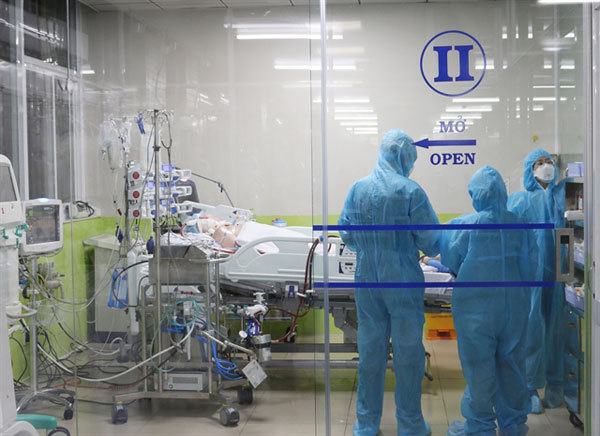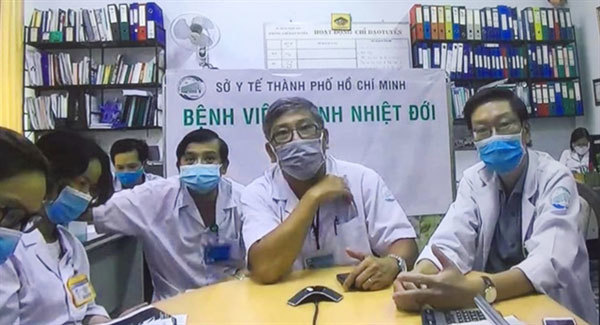 |
| A 43-year-old British pilot for Vietnam Airlines was transferred to Cho Ray Hospital on May 22 from the HCM City Hospital for Tropical Diseases, where he was admitted on March 18. Photo courtesy of the hospital |
The man's condition worsened about a week after his hospital admission on March 18, so a team of experts in infectious disease, hematology, recovery and other fields from the two hospitals was formed to discuss how to treat the pilot.
“He weighed 100 kilogrammes and was 1.81 metres tall, and his body mas index was more than 30, which meant he was classified as obese,” said Dr Nguyen Thanh Phong, head of the HCM City Hospital for Tropical Diseases' department for infectious diseases D.
“For the first days at the hospital, he could walk and was in full possession of his senses,” Phong said.
Pham Thi Tuyen, a nurse in the department, said: “I didn't think at the time that he would have a prolonged stay.”
On March 25, the patient began to have breathing difficulties. Non-invasive ventilation was used until April 5, but the man's situation worsened.
The team of doctors then decided to use an ECMO (extracorporeal membrane oxygenation) machine, which pumps blood out of the body and removes carbon dioxide and sends oxygen-filled blood back.
Phong explained: “His immune system overreacted, releasing proteins called cytokines (causing what is known as a 'cytokine storm'), which severely damaged his lungs. The virus also caused a bleeding disorder. When he was on the ECMO, he had to receive the drug herparin, but he was allergic to it. It can reduce platelet count and cause bleeding, and threaten his life. So the drug was stopped.”
“To replace it, doctors from the two hospitals asked the Ministry of Health to approve imported medicine from Germany that had never been used in Vietnam,” Phong said.
“It took 10 days to receive it. While waiting, we searched medical books for a drug to use. Finally, we decided to use the anticoagulant Xarelto. In the first seven days it was effective, but on the eighth day, the bleeding disorder returned. Luckily, on the 10th day, the medicine arrived. We breathed a sigh of relief. With it, he reacted well."
During his treatment at the HCM City Hospital for Tropical Diseases, doctors and nurses often lost sleep.
“We used all the advanced machines available in the emergency and recovery departments to try to save him,” Phong said.
Initial success
 |
| Experts in infectious diseases, hematology, recovery and other departments at the HCM City Hospital for Tropical Diseases and Cho Ray Hospital are part of a team set up to treat a British pilot for Vietnam Airlines who contracted COVID-19 in mid-March. — Photo courtesy of the hospital |
The patient is currently stable and has recovered 30 per cent of lung capacity. He was transferred to Cho Ray Hospital last Friday to continue treatment and has tested negative for COVID-19 six times.
“Keeping him alive for a long time was necessary because patients can't live for more than 10 days on a ventilator,” Phong said.
Dr Nguyen Tri Thuc, head of Cho Ray Hospital, said the hospital would do its best until a lung transplant operation is performed, as recommended by the National Steering Committee of COVID-19 Prevention and Control.
Phong said: "In my 23 years of working as a doctor, this patient was a special case. My colleagues and I have learned about so many protocols and new medicines that have never been used in the country. This experience for us was very precious.”
Huynh Thi Kim Hue, a nurse at the Hospital for Tropical Disease’s infectious diseases department D, said that nurses were worried during the patient's first few days in the hospital when he was conscious because he ate very little food. The staff then ordered the kind of food he wanted.
“We waited for results of his tests every day. When we saw that he was becoming better, we were happy. We regarded him as a relative.”
The staff had never taken care of someone on an ECMO machine, so the nurses were especially careful, she said.
Because of his size, it was necessary to have four nurses clean him and change the blankets on his bed.
When the patient was transferred to the hospital’s emergency and recovery departments, Hue visited him every day because she wanted to know about his situation.
“I miss him,” Hue said. VNS
Gia Loc

Health ministry considers repatriating British pilot after being treated for coronavirus
Vietnam's most critically ill COVID-19 patient, a British pilot, has now been deemed to be coronavirus-free, and the health ministry is considering the option of bringing him back to the UK for further care depending on his condition.

Lung transplant considered for ailing British COVID-19 patient
The Ministry of Health (MoH) is considering a lung transplant for a British man infected with COVID-19, who was the 91st patient and also the most severe case in the country.
 For over two months, doctors at the HCMC Hospital for Tropical Diseases worked round-the-clock to treat a 43-year-old COVID-19 patient, a British pilot with Vietnam Airlines, before he was transferred to the city's Cho Ray Hospital on May 22.
For over two months, doctors at the HCMC Hospital for Tropical Diseases worked round-the-clock to treat a 43-year-old COVID-19 patient, a British pilot with Vietnam Airlines, before he was transferred to the city's Cho Ray Hospital on May 22.